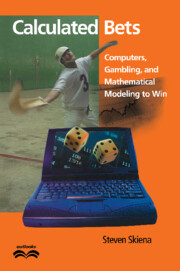Book contents
- Frontmatter
- Contents
- Preface
- Acknowledgments
- 1 The Making of a Gambler
- 2 What Is Jai Alai?
- 3 Monte Carlo on the Tundra
- 4 The Impact of the Internet
- 5 Is This Bum Any Good?
- 6 Modeling the Payoffs
- 7 Engineering the System
- 8 Putting My Money Where My Mouth Is
- 9 How Should You Bet?
- 10 Projects to Ponder
- Glossary
- For Further Reading
- Index
6 - Modeling the Payoffs
Published online by Cambridge University Press: 17 August 2009
- Frontmatter
- Contents
- Preface
- Acknowledgments
- 1 The Making of a Gambler
- 2 What Is Jai Alai?
- 3 Monte Carlo on the Tundra
- 4 The Impact of the Internet
- 5 Is This Bum Any Good?
- 6 Modeling the Payoffs
- 7 Engineering the System
- 8 Putting My Money Where My Mouth Is
- 9 How Should You Bet?
- 10 Projects to Ponder
- Glossary
- For Further Reading
- Index
Summary
Economists are very concerned with the concept of market efficiency. Markets are efficient whenever prices reflect underlying values. Market efficiency implies that everyone has the same information about what is available and processes it correctly.
The question of whether the jai alai bettors' market is efficient goes straight to the heart of whether there is any hope to make money betting on it. All of the information that we use to predict the outcome of jai alai matches is available to the general public. Because we are betting against the public, we can only win if we can interpret this data more successfully than the rest of the market. We can win money if and only if the market is inefficient.
Analyzing market efficiency requires us to build a model of how the general public bets. Once we have an accurate betting model, we can compare it with the results of our Monte Carlo simulation to look for inefficiencies. Any bet that the public rates higher than our simulation is one to stay away from, whereas any bet that the simulation rates higher than the public represents a market inefficiency potentially worth exploiting.
The issue of market efficiency rears its head most dramatically in the stock market. Billions of dollars are traded daily in the major markets by tens of thousands of people watching minute-by-minute stock ticker reports. Quantitative market analysts (the so-called quants) believe that there are indeed inefficiencies in the stock market that show up as statistical patterns.
- Type
- Chapter
- Information
- Calculated BetsComputers, Gambling, and Mathematical Modeling to Win, pp. 109 - 149Publisher: Cambridge University PressPrint publication year: 2001

